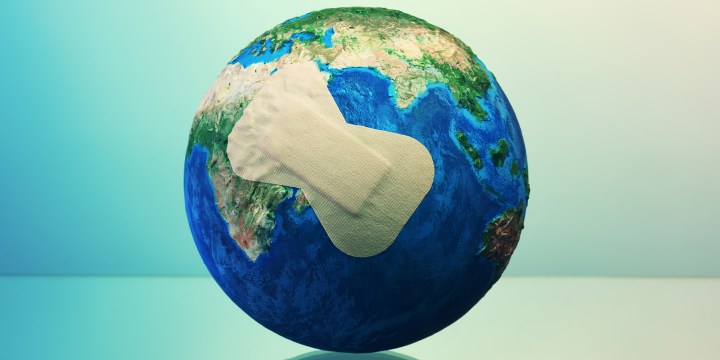OPED - EARTH DAY 2023
Call to action – we have an opportunity to bequeath a healed planet to the next generation

The call to action on Earth Day is to appeal to ordinary people to become more aware of the climate crisis, to make better choices about the brands that they support and to even consider becoming climate activists, because while the future looks bleak, it doesn’t have to be hopeless.
Between 13 and 19 March 2023 the Intergovernmental Panel on Climate Change (IPCC) released its Synthesis Report. It makes for grim reading, but it is especially devastating for South Africa and the region.
South Africa is in an uncomfortable middle ground. Like Australia, we are a major coal exporter and rely heavily on coal for power generation. But unlike Australia, we are a relatively poor country with major development imperatives: world-beating inequality, a stagnating economy and a corrupted, failing national power utility, Eskom.
If there was ever an argument for climate justice, it is in South Africa.
We cannot develop along the lines of the older industrial powers because we have to shift from fossil fuels. On the other hand, not only do we need to look for ways of breaking the stagnation of our economy but the rural poor will increasingly suffer if we see intensified cycles of drought and flooding.
It is in this context that the IPCC projections make grim reading and should sound a call to action. So let us look in more detail at what the IPCC says and what we can do about it.
What the report says
Our burning of fossil fuels has already warmed the world by 1.1°C and we are continuing to burn them as if there is no end in sight. Although the richer countries and people burn more, even within South Africa there is an unequal contribution, with the middle class and wealthy burning more through their energy-intensive lifestyles, including driving cars as well as inefficient and wasteful household and workplace use of electricity.
We can see massive impacts on oceans, weather and the natural world. This is occurring across the Earth but the impacts will be felt disproportionately by the poor, vulnerable and marginalised, the very same people who have historically contributed the least to global emissions.
In the context of climate justice and human rights, this is the worst kind of injustice and we must do everything in our power to address this. Recent cyclones in the Indian Ocean adversely affected Madagascar and Mozambique and led to devastation and loss of life, infrastructure and livelihoods.
Some people are starting to adapt, but not nearly enough. Adaptation isn’t feasible in many areas, and in many areas it won’t be possible at all. To accelerate adaptation we need much more funding, especially in the Global South, to fund a deep and just energy transition.
If all countries were to honour their pledges it still won’t stop us from overshooting 1.5°C. Most countries do not have policies in place nor have they invested the monies needed to meet the climate goals.
Much as we can bemoan the huge climate debt the Global North is passing on to future generations, we have to be realistic about how to bridge the economic chasm — there is no longer an option to develop on the basis of polluting industries.
However, that creates an opportunity: to build the Global South from the start of major economic development on a sustainable basis. While the developed economies have a massive investment in dirty industries, the Global South doesn’t. That creates a possibility to build a new form of economy that builds in social and economic justice, based on sustainability and inclusivity.
Read more in Daily Maverick: Cancel odious Global South debt to accelerate climate justice
One approach to such a new-style economy is the “triple bottom line”, in which social and environmental outcomes are given equal weight with traditional economic outcomes.
Another view is to take a more systemic view of economics, in which sustainability is a pervasive concern: the circular economy.
These views all still assume a fundamentally capitalist market-driven economy. Yet there are those who argue that climate change is a market failure, primarily because markets cannot price externalities — costs that are not directly incurred by the producer.
In the current world economic climate that is dominated by market thinking, we need to challenge the assumption that this is the best approach — or indeed the only approach, as many seem to believe.
Current reality
What is the current reality, based on the world doing business as usual (under the presumption that markets are king)?
If all countries were to honour their pledges it still won’t stop us from overshooting 1.5°C. Most countries do not have policies in place nor have they invested the monies needed to meet the climate goals
Studies show that on the current trajectory we will hit 1.5°C in the 2030s, and every small increase will exacerbate the hazards, but if we act now and with resolve to reduce emissions we will see a noticeable decrease within 20 years.
Therefore it is imperative that we spare no effort to reduce emissions. The fact that we are almost at 423ppm of atmospheric CO2 should frighten us all, but that level barely registers with most people.
So why are we seeing such consistent failure in tackling the issue?
The ideology of the market is applied selectively, and the excessive influence of lobbyists in developed countries and even in the COP process is preventing progress.
The International Energy Agency reports that in 2022, fossil fuel subsidies worldwide topped $1-trillion, doubling the subsidies of the previous year. This is triply astonishing.
First, it gives a lie to the notion that markets are king.
Second, these subsidies increased rapidly when the climate change imperative was to accelerate renewables and, finally, it happened in a year when fossil fuel companies made record profits. All of this does not include indirect subsidies on fossil fuels in the form of wars to protect supply. The US’s war in Iraq cost the US at least $3-trillion when all costs are factored in; this does not count the cost to Iraq and neighbouring countries arising from the rise of Isis.
If you add in the costs of the environmental damage of fossil fuels and the uneven development and corruption, fossil fuels are not the great bargain they are claimed to be. But the key point is that the free market argument is bogus. Fossil fuels have huge advantages over renewable competitors.
So how do we turn this around?
The Global South can and should demand aid and reparations but the targets of this aid need to be specific to the problem. We should also put pressure on more developed countries to focus their own efforts on technologies that we need to enhance economies of scale as well as to promote the right direction for research and development.
It is not all doom and gloom. The cost of renewables is steadily dropping and in countries or regions without infrastructure, renewables can roll out at scale faster than a traditional electricity grid — in much the way a cell network is able to scale up a lot faster than a wired network.
Why?
Because you can start with isolated nodes where there is more economic activity and gradually connect the rest of the country or region as development warrants. A solar-powered microgrid with battery backup is a lot cheaper to install in an isolated place than a connection to a distant national or regional grid.
South Africa has 28,000km of high-voltage lines and 350,000km of lower-voltage power lines. Even so, deep rural areas are not covered. In even less developed countries, building a grid of this scale to justify large-scale power plants would be extremely expensive. A big multimegawatt power station needs a substantial number of consumers to pay its costs and it can’t start small and scale up.
Solar, on the other hand, can start with a few photovoltaic panels and batteries and scale up as demand grows. Ideally, renewables should be connected into a bigger grid to share capacity and demand, to smooth out peaks. However, improvements in battery technology and cost are reducing the advantage of a bigger grid.
Read more in Daily Maverick: We need system change, not climate change — how do we get there?
Stationary power is a relatively easy problem to solve: if you can use electricity, you can plug into whatever is available. If it is an existing fossil-fuelled grid, the power sources can gradually change.
Mobile power is more difficult. Electric trains, trams and trolleybuses all have the same advantage: they become cleaner as the grid becomes cleaner. Electric cars are relatively expensive though the trend in developed countries is increasingly towards making them the standard.
However, mass electrified public transport is a more equitable solution than electric cars.
South Africa has a very poor public transport sector. Minibus taxis run for profit and hence do not service low-demand routes or time slots. The train service is a mess and thus not an immediate option for now. Cities do not have comprehensive bus services, let alone any that are electrically run. Air travel is the one option where electricity is not practical for anything but short-haul flights.
An alternative model
This forces us to consider an alternative model for sustainable development, one which gives us a sound basis for funding real change and creating real opportunity.
We need to work on efficient models of building microgrids of solar plus batteries that can scale up from an isolated relatively small power source to bigger and ultimately national and regional grids. We need to look at mitigating the adverse economic impacts of rapidly moving to renewables.
Though renewables are big job creators, coal miners do not have the skills needed to install solar power. If coal is scaled back, this needs to be taken into account.
Read more in Daily Maverick:
How to beat load shedding at home… and other ideas
Another factor in South Africa is that poorer municipalities rely heavily on electricity revenue. If wealthier households and businesses increasingly rely less on the grid, municipalities will need to invest in their own solar power to mitigate revenue loss. Most won’t have the money to make the required investments. Therefore support for the Just Energy Transition (where no worker is left behind) is fundamental to any path that we choose.
The Global South cannot rely on the goodwill of developed countries, any more than the victim of a burglary can rely on the burglar to come back and make good the damage they did. We need clarity on what our needs are so that we can demand the resources that are our fair share, and where there are gaps we need to do our own research and development. Only by taking charge of our destiny can we truly decolonise the imperatives of climate justice.
The climate justice movements are pushing in the right direction demanding a deep, just and equitable energy transition, but there is much that still needs to be done.
Movements like Debt for Climate that are calling for debt cancellation for the Global South are making the connection between debt and climate action. They are rightfully calling out the hypocrisy of the rich nations which benefited from slavery, colonialism and resource extraction from the Global South and which are the main nations responsible for the climate crisis.
Power and people
But movements and campaigns cannot achieve meaningful change without the active involvement of ordinary citizens. To tackle the climate crisis and to make the greatest impact to prevent an overshoot of the 1.5 degrees limit, millions, if not tens of millions of people across the world are going to have to step up and use their collective power to stop the blind rush into climate catastrophe.
At climate protests there is a chant, “The people have the power”, but we haven’t truly flexed that power. We have not yet used consumer boycotts as a strategy, and this must change.
As an example, let us consider the case of the East African Crude Oil Pipeline, which is being financed by various banks, one of which is Standard Bank in South Africa. Activists have appealed to the bank, protested at its head office and written to the board of the bank not to finance this fossil fuel infrastructure, which has the potential to be a climate and human rights disaster.
The bank has been intransigent on the matter.
Climate activists must change tack and instead of protesting outside the head office, they should call for a boycott of the bank. It’s unconscionable that the bank where ordinary hard-working people save for their children’s future invests in fossil fuels that will destroy that very future through its actions and support for the fossil fuel industry. Perhaps if people knew the truth behind the dirty investments that banks make and the devastating climate impacts these investments will have, they would change how and where they choose to bank.
Therefore the call to action on this Earth Day — which took place on Saturday, 22 April — is to appeal to ordinary people to become more aware of the climate crisis, to make better choices about the brands that they support and to even consider becoming climate activists, because while the future looks bleak, it doesn’t have to be hopeless.
The science confirms that if we act now, as in immediately, we can still stop and even reverse the worst impacts, and thus create for ourselves a liveable future and bequeath a healed planet to the next generation. DM/MC/OBP
Sunny Morgan, the owner of Enerlogy Solar, is a climate justice activist and co-founder of Debt for Climate, a global movement demanding debt cancellation for the global south. Philip Machanick is an emeritus associate professor of computer science at Rhodes University and was active in Green politics in Australia, before returning to South Africa in 2011.





















A very good analysis and fundamentally correct in the solutions proposed. Where this whole article falls down is that not one word is devoted to a totally corrupt government who do not care for what is being advocated. Nothing will change, including the unfortunately unrealistic hope of change in 2024, as long as a corrupt and inept government sits at the southern tip of Africa.